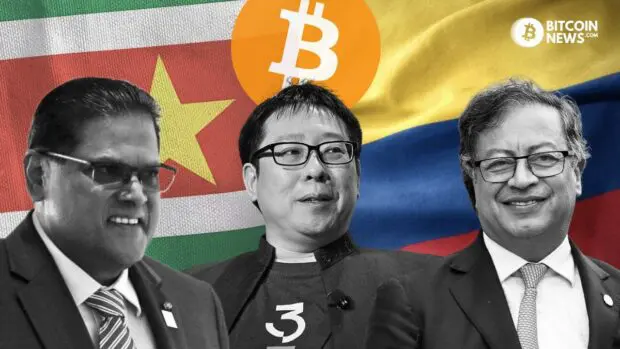In a recent development that has sparked widespread interest among the Bitcoin community, Samson Mow, CEO of Jan3, engaged in significant discussions with the Presidents of Colombia and Suriname. These high-level meetings are focused on fostering Latin America Bitcoin adoption, a region showing increased openness to the potential of Bitcoin.

Boosting Latin America Bitcoin Adoption
Samson noted in an interview with BitcoinNews that it is important to engage with politicians. Otherwise they are likely to push for a CBDC which benefits no one except those who get to control the money. Latin America has been at the forefront of exploring the integration of Bitcoin into their economies, with countries like El Salvador leading the way.
The engagements between Samson Mow and the Presidents of Colombia and Suriname further signify the growing interest in the region. These meetings are critical for dispelling misconceptions about Bitcoin and highlighting its potential as a tool for economic empowerment and sovereignty. By focusing on education and collaboration, there’s an opportunity to create a more informed and supportive environment for Bitcoin adoption.
Related reading: A New Era of Education: El Salvador’s Plan to Introduce Bitcoin Studies
Colombia’s Interest in Bitcoin Mining
Colombia’s interest in Bitcoin mining is a pivotal aspect of these discussions. The country’s abundant renewable energy resources, primarily hydroelectric power, makes it an ideal location for sustainable and cost-effective Bitcoin mining operations.
This move aligned with President Petro‘s ideas, who is eager to push policies that shift Colombia towards environmentally responsible practices. Using methane from dumps is a prime example of how Colombia can use Bitcoin mining to both help the environment and stack cheap sats. President Petro also expressed a desire to let the communities keep the bitcoins earned.
This allows these rural places to fund projects and infrastructure in the remote locations where the mining is taking place. By tapping into this potential, Colombia could establish itself as a key player in the global Bitcoin mining landscape, contributing to the network’s security and decentralization.
Suriname’s Path to Adopting Bitcoin as Legal Tender
Samson highlighted a similar model already in operation within Suriname, where a community is successfully utilizing solar power for Bitcoin mining. Additionally, Suriname is paving the way for the adoption of Bitcoin as legal tender within its borders.
While the country maintains its own national currency, many individuals regularly transact in USD and Euros due to an executive order (EO) authorizing the usage of U.S. and European currencies. Samson Mow astutely observed that given El Salvador’s recognition of bitcoin as legal tender, a similar EO for the digital currency could be created. This effectively enables bitcoin to function alongside other currencies within the nation’s economic framework.
Following El Salvador’s bold step in making Bitcoin legal tender, Suriname’s interest could have a ripple effect in the region. There is no doubt that adoption of bitcoin as legal tender could streamline financial systems, and reduce dependency on traditional banking.
Conclusion

The meetings between Samson Mow and the Presidents of Colombia and Suriname highlight growing momentum for Bitcoin adoption in Latin America. These discussions represent an important opportunity to showcase Bitcoin’s transformative potential to political leaders in the region.
However, many Bitcoiners understandably remain skeptical of politicians and their motives. While further regulatory clarity could enable greater integration of Bitcoin into these economies, we must ensure it does not come at the expense of Bitcoin’s core ethos of empowering individuals through decentralization and permissionless peer-to-peer transactions.
Moving forward, advocates of Bitcoin should persist in highlighting its capacity to empower financial independence for individuals globally. The adoption of this mindset by more Latin American leaders could avert a scenario where Central Bank Digital Currencies (CBDCs) and social credit scores become mandatory for economic participation.
This approach can prevent a future dominated by central control, where Bitcoiners are forced to resort to black markets. Instead, nations such as Colombia and Suriname have the opportunity to become strongholds of financial inclusivity and liberty by fully leveraging Bitcoin’s potential.
Through principled ethical advocacy, this promising momentum in Latin America can lead to greater Bitcoin adoption while retaining its values of individual empowerment and decentralization. The choices made today will determine what future holds — celebration of freedom or its forfeit. Bitcoiners have an important voice in steering the course.










